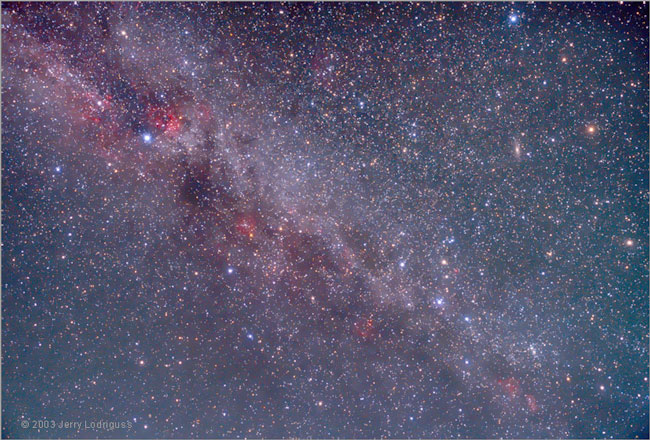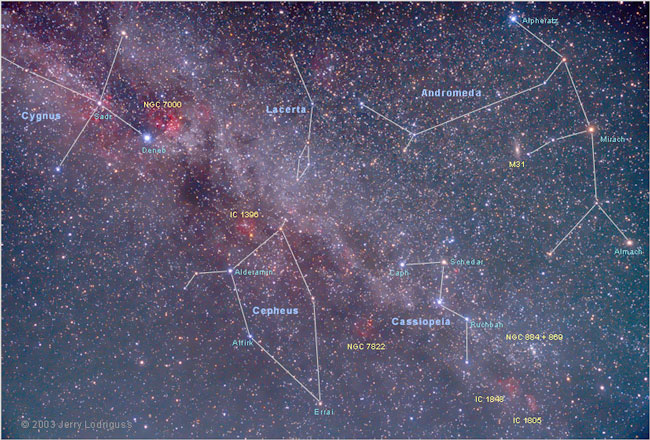Skip to comments.
Astronomy Picture of the Day 8-25-03
NASA ^
| 8-25-03
| Robert Nemiroff and Jerry Bonnell
Posted on 08/24/2003 11:05:23 PM PDT by petuniasevan
Astronomy Picture of the Day
Discover the cosmos! Each day a different image or photograph of our fascinating universe is featured, along with a brief explanation written by a professional astronomer.
2003 August 25


The Northern Milky Way
Credit & Copyright: Jerry Lodriguss (Astropix.com)
Explanation: Many of the stars in our home Milky Way Galaxy appear together as a dim band on the sky that passes nearly over the Earth's north and south poles. Pictured above is the part of our Galaxy that passes closest over the north pole. Placing your cursor over the image will bring up the names of several constellations and bright stars. The diffuse white Galaxy glow is created by billions of stars, while red patches are large emission nebulas, usuallhttp://antwrp.gsfc.nasa.gov/apod/y marking areas where bright stars have recently formed. In the north, all of the lights visible at night and all lights that created this image were emitted within the past few thousand years from within the Milky Way Galaxy -- except one. On the upper right is a small faint patch designated M31, the Andromeda Galaxy. M31 is a spiral galaxy similar to our Milky Way but so distant it emits the oldest light distinguishable by the unaided eye -- light that takes over two million years to reach us.
TOPICS: Astronomy; Astronomy Picture of the Day; Science
KEYWORDS: galaxy; m31; milkyway; northern
This is another image which is supposed to change upon moving the mouse cursor over it. Unfortunately javascript will not work on the FR forum. So I posted the second image separately.
Live thread on SIRTF (Space InfraRed Telescope Facility) launch!
NASA Telescope Atop Boeing Delta 2 - Launch Underway
To: MozartLover; Joan912; NovemberCharlie; snowfox; Dawgsquat; viligantcitizen; theDentist; ...
2
posted on
08/24/2003 11:06:46 PM PDT
by
petuniasevan
(...it's as easy as 3.141592653589793238462643383279502841.)
To: petuniasevan
BTTT
3
posted on
08/25/2003 4:49:57 AM PDT
by
GodBlessRonaldReagan
(where is Count Petofi when we need him most?)
To: petuniasevan
Thanks for the ping
4
posted on
08/25/2003 9:09:32 AM PDT
by
firewalk
To: petuniasevan
Where is Polaris?
5
posted on
08/26/2003 4:49:06 PM PDT
by
boris
(Education is always painful; pain is always educational.)
To: boris
Well, you're supposed to run across it if you draw a line through the first two stars of Cassiopeia and go toward the left of the picture (assuming we're facing north).
6
posted on
08/26/2003 5:03:29 PM PDT
by
aruanan
To: boris
And Lacerta looks more like a spermatozoan than a lacerta.
7
posted on
08/26/2003 5:04:59 PM PDT
by
aruanan
To: boris
Polaris? It's also known as Alpha Ursae Minoris, or the North Star. You will find it in the northern sky very close to the North Celestial Pole. This is the imaginary point that the sky seems to revolve around in the Northern Hemisphere.

An easy way to locate it is to first find the "Big Dipper" (part of Ursa Major). Note the two stars at the end of the "bowl". Trace a line from them and you should arrive at the vicinity of Polaris.

8
posted on
08/26/2003 5:07:38 PM PDT
by
petuniasevan
(Death and taxes are both certain, but death at least isn't an annual event.)
To: boris
Ah. In relation to the above image (doh!)...

As the above chart shows, it would be a little ways below the APOD image, about where the link "pole" is located.
9
posted on
08/26/2003 5:14:17 PM PDT
by
petuniasevan
(Death and taxes are both certain, but death at least isn't an annual event.)
To: petuniasevan
Hmm. My solid geometry was never so good, but I take it that the ecliptic of the solar system is roughly at right angles to the galactic plane?
--Boris
10
posted on
08/27/2003 6:26:01 AM PDT
by
boris
(Education is always painful; pain is always educational.)
To: boris
Not only is the plane of the solar system (the ecliptic) tilted with respect to the plane of the Milky Way (galactic equator) but the Earth's axis is also tilted with respect to the ecliptic.
The north pole of the solar system (north ecliptic pole) lies about 23.5 deg away from polaris in the constellation Draco (18h 00m R.A.) and the North pole of our Galaxy (north galactic pole) lies about 27 deg away from Polaris in the constellation Coma Berenices (12h 51m R.A.).
Thus the Galactic Equator is tilted 62.6 degrees with respect to the plane of the Ecliptic.
A good way to see this is either to look at sky maps in a good star atlas or obtain a good astronomy software program. I use Starry Night Pro; it costs $$$. There are freeware and shareware programs out there; here is a great free program called StarCalc.
http://www.relex.ru/~zalex/main.htm
11
posted on
08/27/2003 1:35:56 PM PDT
by
petuniasevan
(Death and taxes are both certain, but death at least isn't an annual event.)
Disclaimer:
Opinions posted on Free Republic are those of the individual
posters and do not necessarily represent the opinion of Free Republic or its
management. All materials posted herein are protected by copyright law and the
exemption for fair use of copyrighted works.
FreeRepublic.com is powered by software copyright 2000-2008 John Robinson





